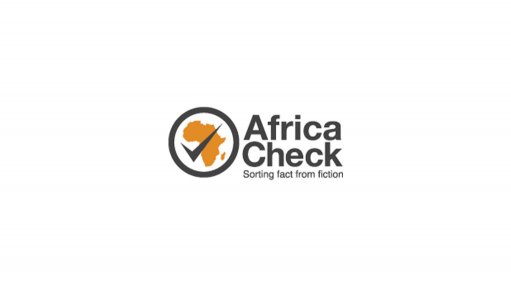
With the stakes high in an election year, South Africa’s ruling party sought to play up its achievements in the 25 years it has been in power.
Party president Cyril Ramaphosa delivered the party’s traditional “January 8th statement” which this year marks the organisation’s 107th birthday.
Here are the first of a number of claims from his speech we are checking. We will update this report with completed checks.
Service delivery
The claim that in 1994 only around 30% of people in South Africa had electricity in their homes is not new and has been debunked before.
There isn’t much data on national access to electricity before 1994. Statistics South Africa’s earliest data on electricity access is from the 1995 October Household Survey. It found that 63.5% of households used electricity for lighting that year.
Stats SA told Africa Check that the 1995 data isn’t used often as the survey was “hamstrung by a series of methodological and practical issues”. The agency’s earliest solid data is from the 1996 Census, which found that 58.2% of households had electricity.
The Southern African Labour and Development Research Unit conducted a national survey of living conditions in South Africa in 1993 and 1994. It estimated that 53.6% of households had access to electricity in those years.
The sample was fairly small, at fewer than 9,000 households. But Professor Ingrid Woolard, a University of Cape Town economics professor whose research interests include survey methodology, previously told Africa Check that while there would be “some margin of error” the survey was “fairly reliable”. – Naphtali Khumalo
Statistics South Africa’s 2017 general household survey shows that most people (73.3%) reported having pre-paid electricity in their homes. A further 12.7% had conventionally metered electricity.
This means 86% of South Africans had electricity in their homes in 2017. – Naphtali Khumalo
Statistics South Africa’s 2017 general household survey estimated that 88.6% of households had piped or tap water.
Isabel Schmidt, chief director of service delivery statistics at the agency, told Africa Check she thought the 88.6% was probably rounded up to 9 out of 10. She said piped water “theoretically should be clean”.
Rating piped water standards
But there were problems with the reliability of piped water, Dr Kirsty Carden, a research officer in the urban water management research unit of the University of Cape Town’s civil engineering department, told Africa Check.
“I think particularly if you start looking at consistency and the fact that clean running water is available at all times, I don’t think that [90%] would be correct.”
In 2017 just over a fifth (22%) of households said their water supply didn’t work properly. Some 63.9% of households said their water service was “good”, 25.3% said it was “average” and 10.8% said it was “poor”.
When Stats SA asked households for their opinions on water quality, 7.3% said their water wasn’t safe to drink. The share was highest (14.3%) in Mpumalanga. – Naphtali Khumalo
Education
The department of basic education’s National School Nutrition Programme is meant to provide one meal a day to all pupils in poorer primary and secondary schools.
According to the department’s 2017/18 annual report, the programme reached 9,247,359 pupils in 21,277 schools in 2017.
In 2017 department officials visited 209 schools in all nine of the country’s provinces to check on the programme. Of these schools, 195 (93%) were “feeding on the day of the visit”. Schools that weren’t feeding said the food was late or hadn’t been delivered.
Statistics South Africa’s 2017 general household survey shows the feeding scheme reached 11,149,171 pupils in 2017. Of those, 8,830,511 pupils said they got food every day and 592,217 said they were fed a few times a week. A million pupils said that they did not get food even though they were part of the scheme.
Pupils depend on food
In 2017, it was reported that some KwaZulu-Natal feeding scheme suppliers, meant to provide meals to thousands of the province’s pupils, did not exist. Yet the companies had contracts with the KwaZulu-Natal department of education.
“The implementation of the [programme] in KwaZulu-Natal has been beset with problems for years, including reports of tender irregularities, poor administrative capacity and non-delivery,” Hopolang Selebalo, co-head of research at advocacy group Equal Education, told Africa Check.
“Although, on the surface, the roll-out of the National School Nutrition Programme seems almost faultless, it is imperative that the department of basic education and parliament monitor its actual implementation in schools, across provinces,” she said. – Cayley Clifford